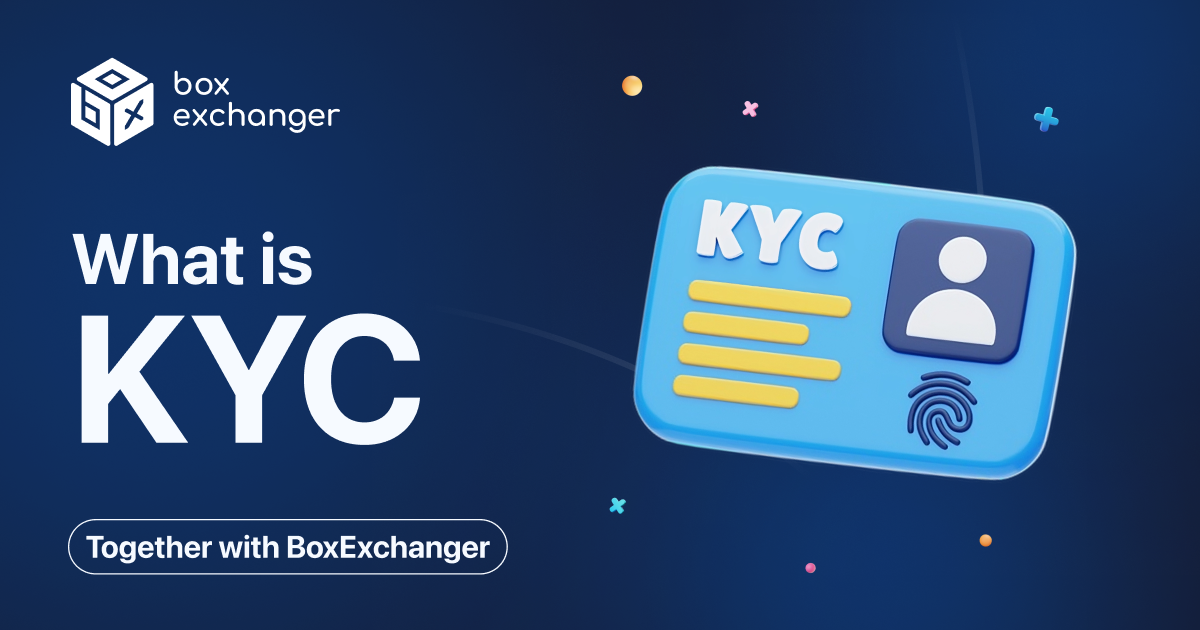5 min.
What is KYC
Added: January 17, 2025

With the growth of the cryptocurrency market, many have likely encountered new abbreviations and terms. Today, we will take a closer look at one of them: what is KYC? This abbreviation stands for "know your customer/client," which means "know your client." KYC is a mandatory process for verifying a customer's personal data conducted by financial institutions to protect users from fraud. Through this process, financial institutions can confirm whether a customer truly is who they claim to be. Let’s delve deeper into what KYC is and how it works.
Key Information About KYC Verification
KYC verification involves various procedures that financial institutions use to determine who can and cannot become their clients. If, during identity verification, it is discovered that someone may be connected to fraudulent activities, their registration will be denied. KYC verification requires the submission and review of documents that confirm identity. These may include ID cards, passports, utility bills, and more.
Main Stages of the KYC Process
The KYC process includes several stages:
- Client verification: Clients must provide complete information about themselves, such as full name, email, phone number, ID card, utility bills, and so on. The company will check all submitted information for authenticity.
- Client assessment: After receiving the information, the company evaluates the risk of illegal actions by the client. This includes checking whether the user is listed as a politically exposed person, in terrorist databases, or reviewing their past financial transactions and credit history.
- Enhanced due diligence: If potential risks are identified during the assessment stage, an additional review is conducted. This includes clarifying the origin of funds, monitoring transactions, and conducting on-site checks to better understand the client’s profile.
- Ongoing monitoring: This stage involves reviewing the client’s business partners, completed transactions, and other activities.
Such verification allows financial institutions to ensure that working with a specific client is safe.
Tips for Successfully Passing KYC
Financial institutions collect KYC information regularly. How can you pass such verification? Know your customer/client is an important step to ensure safety and compliance with financial transaction regulations.
To successfully complete the KYC process, follow these important recommendations: Provide accurate information: This includes personal details, residence address, contact information, and other data required for identification. Be ready to submit supporting documents: These may include passport details, income statements, bank account statements, and other documents based on the organization’s requirements. Fill out all necessary forms correctly and promptly: Errors or omissions can delay the KYC process and result in additional checks. Ensure the confidentiality and security of your data: Provide information only on official websites and platforms, use strong passwords, and do not share your data with third parties. Be prepared for additional checks: KYC is a process that requires interaction and cooperation from the client, so it’s essential to show patience and readiness to collaborate.
In general, successfully passing KYC depends on the accuracy, timeliness, and correctness of the provided data. Adhering to all organizational requirements, readiness to cooperate, and protecting your confidentiality will help speed up and simplify the KYC process.
Pros and Cons of KYC
KYC verification has its pros and cons, which are detailed below:
| Pros | Cons |
|---|---|
| Secure trading on cryptocurrency exchanges, absence of fraudsters, and legal money transactions. | Discomfort due to personal data being shared with others. |
| Exchanges can verify all users and ensure they are not involved in terrorism. | High costs for specialized software. |
| Trusted companies conducting KYC can help convert crypto to fiat and open accounts worldwide. | Data storage costs. |
| All funds on the exchange originate from reliable sources. | Regular security audits are required. |
| Visa and Mastercard work directly with such companies. | Verification takes additional time. |
| These financial institutions comply with all legal norms and regulations. | Significant investments in training and staying updated with regulations. |
Differences Between KYC and AML
KYC (Know Your Customer) and AML (Anti-Money Laundering) are closely related concepts that ensure compliance with laws and regulations in the financial sector. Although both aim to combat financial crimes such as money laundering and terrorism financing, they have distinct characteristics and goals.
KYC: A process through which companies gather information about their clients to verify their identity and assess potential risks. This involves collecting personal data such as passport details, addresses, phone numbers, and other identification information. KYC enables companies to ensure they are not dealing with fraudsters or individuals involved in financial crimes. AML: A set of procedures and measures aimed at preventing the use of financial tools for laundering proceeds from criminal activities and financing terrorism. The primary goal of AML is to detect and prevent illegal money operations linked to criminal activity. Companies must implement mechanisms for monitoring and controlling their clients' financial transactions.
While KYC and AML serve different purposes, they complement each other and are essential for compliance in the financial sector. KYC helps companies identify their clients, while AML uses that information to prevent potential crimes involving financial transactions.
Together, these measures ensure the transparency and trustworthiness of financial operations, safeguarding the financial system from illegal activities.
Consequences of Failing to Comply With KYC
Adhering to KYC requirements is crucial, as non-compliance can have serious consequences for both businesses and clients. KYC is a vital tool in combating money laundering, terrorism financing, and other crimes. Ignoring KYC requirements can lead to hefty fines, loss of reputation, and even legal action.
For companies, non-compliance with KYC can result in their services being used for illegal operations. This may lead to account freezes, license revocations, and reduced client trust. Banks and other financial institutions could suffer significant losses due to fines and reputational damage. For clients, failure to comply with KYC may prevent them from opening accounts, conducting large transactions, or accessing financial services. This creates additional difficulties and costs for clients who might be denied transactions due to insufficient information.
The consequences of failing to meet KYC requirements can be devastating for all parties involved. Therefore, adherence to these rules is critical. Companies should invest in appropriate systems and train their staff to prevent violations. Clients, in turn, should be prepared to provide the necessary information for KYC compliance.
Given the severity of the consequences, both companies and clients must strictly follow KYC regulations. Doing so will help prevent financial crimes and ensure the safety and trustworthiness of the financial system.
In conclusion, we have examined what KYC is, its advantages and disadvantages, and the consequences of non-compliance. It is essential to provide truthful information during the verification process. Otherwise, you may fail the verification, and your accounts could be blocked. Work diligently, regularly provide required reports, and no checks will trouble you.
Also read

December 25, 2025
Multi-signature in cryptocurrency
One of the most practical techniques in crypto asset management is multi-signature in the Bitcoin network: transfer...

December 24, 2025
How to increase conversion on an exchange website
The purpose of this article is to increase conversion on an exchange website through speed, convenience, and trust,...

December 3, 2025
On-chain and off-chain transactions
On-chain and off-chain transactions for cryptocurrency exchange owners are not just theory—they are the foundation ...